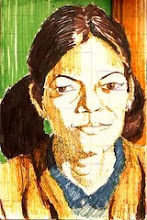I knew of Khushwant Singh when he was at the prime of his career. He was editing the Illustrated Weekly of India and wrote some pretty irreverent stuff. He took a lot of flak for being an exhibitionist and mouthing (that is, writing) controversial stuff. His writings seemed to revolve around wine and women and seemed to be deliberately contrary to popular opinion. This is how I perceived him. His columns were generally trashy and pieces of trivia, laced with jokes and shairi. I read a short story or an excerpt of his novel here and there. The pulled out pieces were usually erotic and simply reinforced the general image of him as a boozing and a womanizing old man. A Dirty Old Man is what he was called.
Years later he happened to visit my office with his wife. I was surprised to see an old man walk in with his wife. There was no bulb over his head and no glass of whiskey in his hand. He looked like a usual elderly gentleman. About a year or so back i read an interview where he had described his daily routine. He got up early, he listened to the direct telecast of kirtan from Darbar Sahib on the radio, ruminated on some shabd or kirtan, wrote some mandatory pages each day, and generally seemed to lead a very disciplined, sedentary life. This looked more like a nonagenarian leading an exemplary life.
Some time ago I picked a book called Delhi from my library. Khushwant Singh reinforces his reputation of being an iconoclast. In this book, the hero isn't a handsome rich young man, but a middle-aged, ugly Sikh. His heroine isn't a beautiful woman with a thousand virtues, she is a hermaphrodite called Bhagmati. The story of Delhi is revealed to us in flashbacks even as we explore the present day Delhi with Bhagmati and Sardarji.
The magnificent, the merciless, the munificent, the marauder, the people who uplifted and raped Delhi in quick succession, are the ones who enrich this novel. We are taken from the times of Balban, AD 1200 to 1984 when Delhi was shaken by the anti-Sikh riots post Indira Gandhi’s murder. Of course not in detail, or it would have filled a number of books. Rather than relate the history of Delhi to us in a mundane manner, he chooses to let a fictional citizen of those times tell us the story. Therein lies the beauty of the novel. It is extremely readable, the first requirement of anything that passes through the printing presses.
Khushwant Singh is totally irreverent, liberal with erotic descriptions, and busts many historical myths. He does not fear to call a spade a spade and that is what makes his novel such a great read. I realize now that the fearsome reputation he garnered was probably bestowed upon him by jealous colleagues. He was ahead of his time by decades and stood by whatever he said and believed in.
Of all the pulp fiction I have read, his is the best. He is so good that he threatens to invade into territory usually occupied by Literature.
Years later he happened to visit my office with his wife. I was surprised to see an old man walk in with his wife. There was no bulb over his head and no glass of whiskey in his hand. He looked like a usual elderly gentleman. About a year or so back i read an interview where he had described his daily routine. He got up early, he listened to the direct telecast of kirtan from Darbar Sahib on the radio, ruminated on some shabd or kirtan, wrote some mandatory pages each day, and generally seemed to lead a very disciplined, sedentary life. This looked more like a nonagenarian leading an exemplary life.
Some time ago I picked a book called Delhi from my library. Khushwant Singh reinforces his reputation of being an iconoclast. In this book, the hero isn't a handsome rich young man, but a middle-aged, ugly Sikh. His heroine isn't a beautiful woman with a thousand virtues, she is a hermaphrodite called Bhagmati. The story of Delhi is revealed to us in flashbacks even as we explore the present day Delhi with Bhagmati and Sardarji.
The magnificent, the merciless, the munificent, the marauder, the people who uplifted and raped Delhi in quick succession, are the ones who enrich this novel. We are taken from the times of Balban, AD 1200 to 1984 when Delhi was shaken by the anti-Sikh riots post Indira Gandhi’s murder. Of course not in detail, or it would have filled a number of books. Rather than relate the history of Delhi to us in a mundane manner, he chooses to let a fictional citizen of those times tell us the story. Therein lies the beauty of the novel. It is extremely readable, the first requirement of anything that passes through the printing presses.
Khushwant Singh is totally irreverent, liberal with erotic descriptions, and busts many historical myths. He does not fear to call a spade a spade and that is what makes his novel such a great read. I realize now that the fearsome reputation he garnered was probably bestowed upon him by jealous colleagues. He was ahead of his time by decades and stood by whatever he said and believed in.
Of all the pulp fiction I have read, his is the best. He is so good that he threatens to invade into territory usually occupied by Literature.

No comments:
Post a Comment